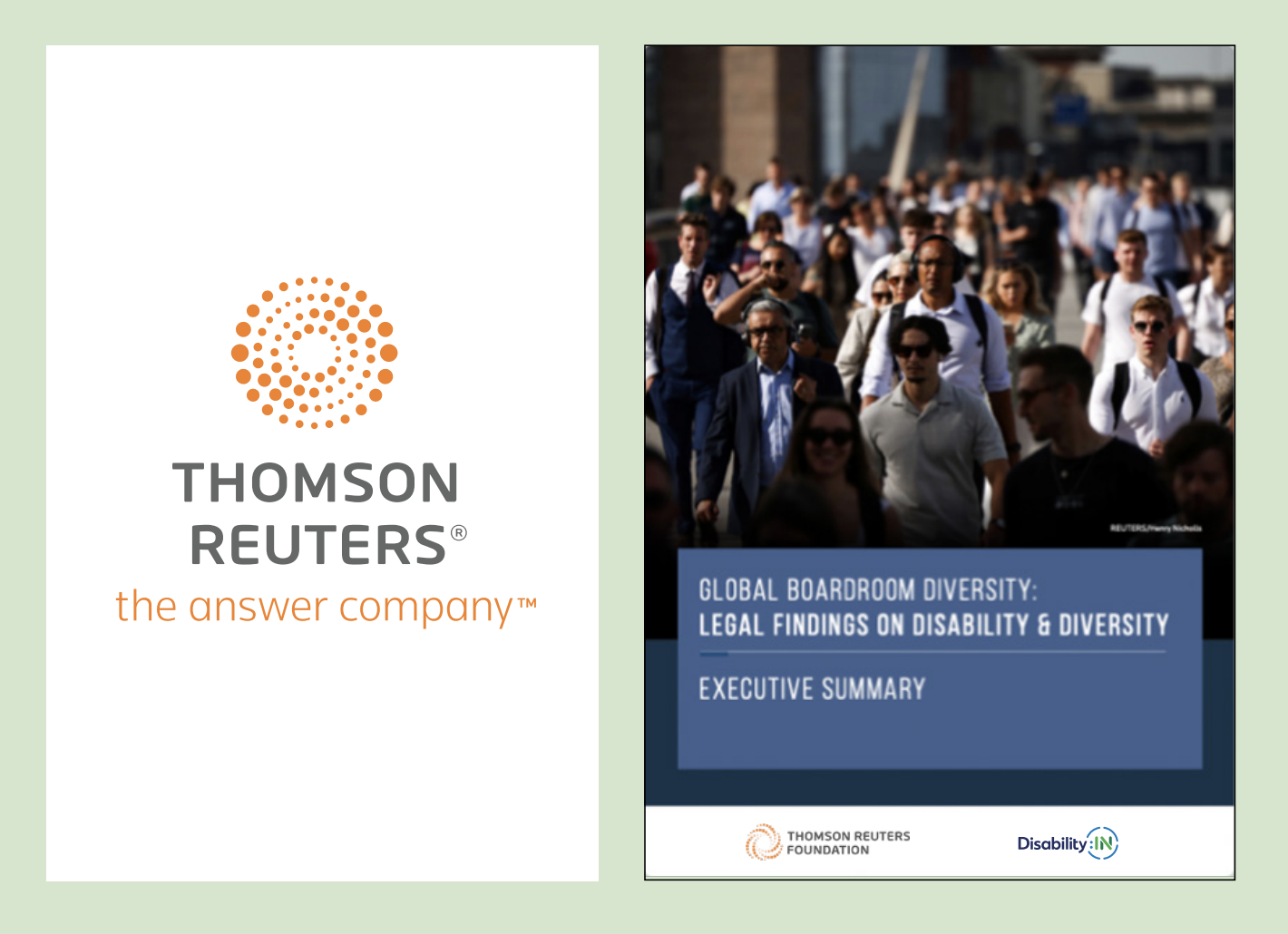Executive Summary
The Disability Equality Index (DEI) has become the leading independent, third-party resource for benchmarking disability inclusion policies and programs inside corporate America, and is now trusted by more than 70% of the Fortune 100 and nearly half of the Fortune 500. Since its inception in 2015, participation in the DEI has grown 6x – from 80 companies in the DEI’s inaugural year to 485 in 2023. A joint initiative of Disability:IN and the American Association of People with Disabilities (AAPD), the DEI is an objective, reflective, forward-thinking, and confidential disability rating tool designed to assist business in advancing inclusion practices. It is a comprehensive benchmark that helps companies build a roadmap of measurable, tangible actions across six categories: Culture & Leadership, Enterprise-Wide Access, Employment Practices, Community Engagement, Supplier Diversity, and Non-U.S. Operations (not weighted).
A total of 405 companies achieved top scorer status on the 2023 DEI with scores of 80 and above, and these companies have been recognized as 2023’s “Best Places to Work for Disability Inclusion”. A visible commitment to disability inclusion by senior leadership is highly correlated with strong performance on the DEI as 87% of the 164 companies whose CEO has signed Disability:IN’s CEO Letter on Disability Inclusion scored 80 or above in 2023. The companies that have completed the DEI and the leaders who’ve signed the CEO Letter recognize that the 1.3 billion people living with a disability worldwide represent a tremendous source of talent and innovation for their workforce and market share for their brands, and they’re leveraging the DEI to help them build accessible, equitable, and inclusive businesses that resonate with people with disabilities.
Among the practices that have become foundational to a disability-inclusive organization, 89% of DEI participants indicate that they have a disability-focused Employee Resource Group and 91% include disability-focused information in new hire orientation. Workplace mental wellness and flexible work options became critical points of emphasis during the Covid-19 pandemic, and these trends only appear to be strengthening post-pandemic as 99% of DEI participants report offering flexible work options (up from 96% in 2022) and 85% offer wellness benefits that extend beyond their employee assistance program (EAP) and mental health benefits (84% in 2022). All of this points to a growing collective voice that is calling for greater disability inclusion inside corporations, galvanized by an increased emphasis on confidential self identification initiatives. A total of 93% of DEI participants encourage employees to self-identify as a person with a disability (91% in 2022), and this focus likely contributes to a rise in median corporate self identification rates to 4.6% among companies reporting data which is up from a median of 4% in 2022.
Additionally, a two-year unscored Global Disability Equality Index (Global DEI) pilot concluded in 2022. The pilot achieved participation from 98 companies spanning 66 countries. Findings from the Global DEI pilot informed the launch of a scored benchmark that will open in 2024 to a broader range of companies.
Landscape Overview
The frenetic pace of change of today’s post-pandemic, politically polarized marketplace increasingly moves at the speed of social media which can often blur the boundaries of objectivity and opinion. Consequently, at the center of contemporary public discourse in the U.S. lies a debate surrounding diversity, equity, and inclusion programming and Environmental, Social, and Governance (ESG) priorities. Such initiatives gained momentum inside corporations following the murder of George Floyd, however these commitments appear to be receding amidst “anti-ESG” backlash and ongoing macroeconomic concerns such as inflationary pressures and the looming threat of a recession. These factors, in part, have contributed to a broad feeling of “diversity fatigue” across society and an overwhelming sense of burnout among corporate D&I practitioners who’ve seen budgets, headcounts and organizational support dwindle in recent months.
Despite these overarching headwinds, the commitment to advancing disability inclusion inside corporate America seems stronger than ever as evidenced by a 17% increase in Disability Equality Index (DEI) participation from 2022 to 2023. While disability is often opined as the “forgotten D in diversity”, corporate disability programming might be experiencing unexpected, albeit potentially short-term, insulation thanks to this phenomenon, generally seen as a negative, by which disability lies outside the scope of most ESG criticism.
Disability has largely been considered a politically neutral topic in the U.S. for decades as disability-focused legislation has been introduced from both sides of the aisle. The landmark Americans with Disabilities Act (ADA), which enumerates disability civil rights, famously garnered bipartisan support at the time of its 1990 passage. If disability-specific policies can continue to largely avoid association with the unfavorable sentiments attached to more broad-based ESG agendas while leveraging the ubiquity of disability within every demographic and political affiliation, there exists potential for progress towards even greater equity for people with disabilities in the workplace, marketplace, and supply chain.
There remains a compelling business case, first articulated in 2018 in Getting To Equal: The Disability Inclusion Advantage, that companies committed to disability-inclusive practices outperform their peers in critical financial metrics such as revenues, net income, and economic profit margin. There are sound indications that the business case has only strengthened in the subsequent years, and full findings are expected to be published later this year by Accenture in a refresh of the “Getting To Equal” research. When it comes to consumer behavior, an April 2023 survey of 2,200 U.S. adults conducted by Morning Consult, on behalf of Voya Financial, found that 84% of respondents have a more favorable impression of companies that are inclusive of people with disabilities in their advertising/marketing efforts and 80% want to do more business with these companies.
Finally, disability employment is perched on the precipice of perhaps the most promising positioning we’ve ever experienced for positive long-term, sustainable outcomes following the Covid-19 pandemic. The U.S. Department of Labor reports that while employment participation ratios at the outset of the pandemic dropped similarly for both disabled and non-disabled workers, by August 2021 the ratio for people with disabilities had fully recovered to pre-pandemic levels while the ratio for non-disabled individuals was still below what it was before Covid-19 as of January 2023. This accelerated recovery rate for disability employment ratios is attributed to the rise of remote options in the midst of the pandemic. As companies continue to pursue return-to-office solutions, it is critical that employers don’t sacrifice the progress that resulted from virtual and work-from-home opportunities that helped create more equitable employment outcomes for people with disabilities.
Key Takeaways
Against this backdrop, disability inclusion maintains the power to transform company culture as demonstrated by a steady increase in the creation of disability-focused Employee/Business Resource Groups (E/BRGs). Today, 89% of Disability Equality Index (DEI) companies have a disability E/BRG with nearly half founded in the past five years. The grassroots, bottom-up impact that can be expected from a high saturation of E/BRGs can be truly catalyzed when coupled with a strong, top-down commitment from senior leadership. Internal allyship for the disability community by at least one senior executive is present at 92% of DEI companies. Moreover, a framework for fostering a disability-inclusive culture is established from Day 1 at most companies as 91% of DEI participants include disability inclusion information in new hire orientation.
It’s becoming increasingly important for companies to understand the full composition of their workforce. This is demonstrated by 93% of DEI companies encouraging their employees with disabilities to confidentially self-identify. An estimated median 4.6% of U.S. employees at companies that submitted data via the DEI self-identify as a person with a disability, up from 4% on the 2022 DEI. While this positive trend is encouraging – especially for federal contractors with Office of Federal Contract Compliance Programs (OFCCP) aspirational goals of 7% disability representation across all job groups – a new report from Boston Consulting Group (BCG) found that “employees with disabilities significantly under disclose to their employers”. The BCG report projected the workforce prevalence of disability to be 25% which is more aligned with the World Health Organization’s estimate that 16% of the global population lives with a significant disability. Self identification is becoming a powerful mechanism for companies to capture increasingly complex and critical employee information. Traditional binaries are giving way to more nuanced and fluid identities that are both apparent and non-apparent, and that can only be fully identified by the individual themselves. The potential for people with disabilities is significant as increased self identification rates can strengthen the collective voice of a community that is often underrepresented in the workplace.
Disability:IN recently released research on the role of voluntary self identification in the workplace. The report offers a blueprint for increasing disability self identification rates over time while building company trust through measurement, education, and strategic disclosures.
The focus on internal self identification campaigns is also beginning to slowly make Its way into external disclosures and benchmarking strategies.
This type of public disclosure of disability data allows companies to begin benchmarking internal progress and make the case for implementing programs — from E/BRGs to hiring initiatives to accessibility commitments — that both increase the representation of people with disabilities and help to ensure their full participation. For instance, corporate accessibility programs continue to gain momentum as 64% of DEI companies now report having a requirement to make their digital products accessible and usable for people with disabilities (up from 62% in 2022) and 60% have a plan in place to ensure that social media postings are accessible (55% in 2022).
These positive indicators obscure the fact that disability representation remains nearly non-existent inside corporate board rooms. Only 7% of DEI companies report having a director on their corporate board who openly identifies as disabled. Similarly, just 7% of DEI companies mention disability in the documents that govern the nomination of new board directors, though another 7% say they plan to integrate disability into their nomination charters in the next year. In June 2023, Disability:IN and the Thomson Reuters Foundation published a legal brief on the absence of board-level disability disclosures and called on private sector mechanisms to begin tracking disability inclusion in corporate governance to promote regulatory disclosures for board-level diversity that includes disability.
Today 69% of DEI companies issue annual diversity reports, and 24% of companies now include disability data in their reporting.
Only the Toronto Stock Exchange and the London Stock Exchange include individuals with disabilities in their board-level disclosures. Click to read Disability:IN’s legal report, co- authored with the Thomson Reuters Foundation, on global diversity disclosures.
By the Numbers
| Total Participating Companies | 485 |
| Companies with Non-U.S. Operations | 374 |
| Total U.S.-Based Employees | 16.9 million |
| Total Non-U.S.-Based Employees | 13.2 million |
| Industries represented | 30 |
| Median Disability Self Identification Percentage* | 4.6% |
| Median New Hire Disability Self Identification Percentage* | 4.5% |
| Number of Top Scoring Companies | 405 |
| Number of Companies that Scored 100 | 294 |
| Number of Companies that scored 90 | 66 |
| Number of Companies that scored 80 | 45 |
Top 10 Industries Represented in 2023 DEI
| Technology | 66 |
| Banking, Financial, and Asset Management | 58 |
| Healthcare, Health Service, and Healthcare Medical Facilities | 47 |
| Consulting and Professional Services | 40 |
| Insurance | 30 |
| Manufacturing | 29 |
| Retail and E-Commerce | 25 |
| Energy and Utilities | 22 |
| Pharmaceuticals | 17 |
| Food, Beverage, and Groceries | 14 |
| Telecommunications | 14 |
DEI Growth
Total DEI Participants
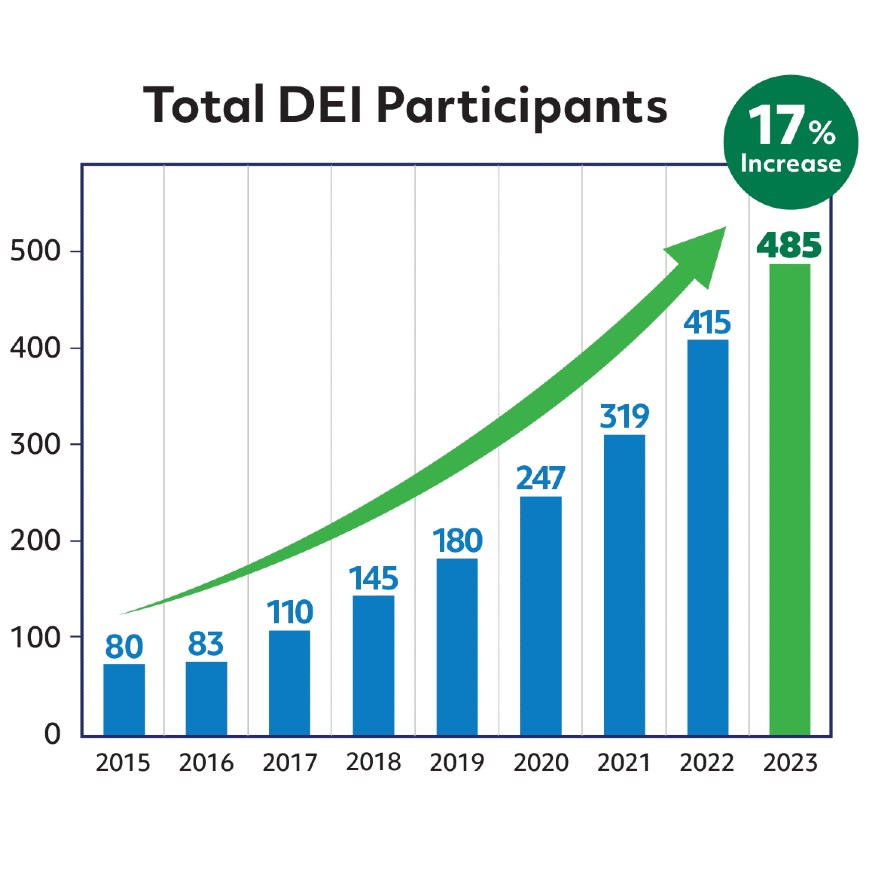
Fortune 100
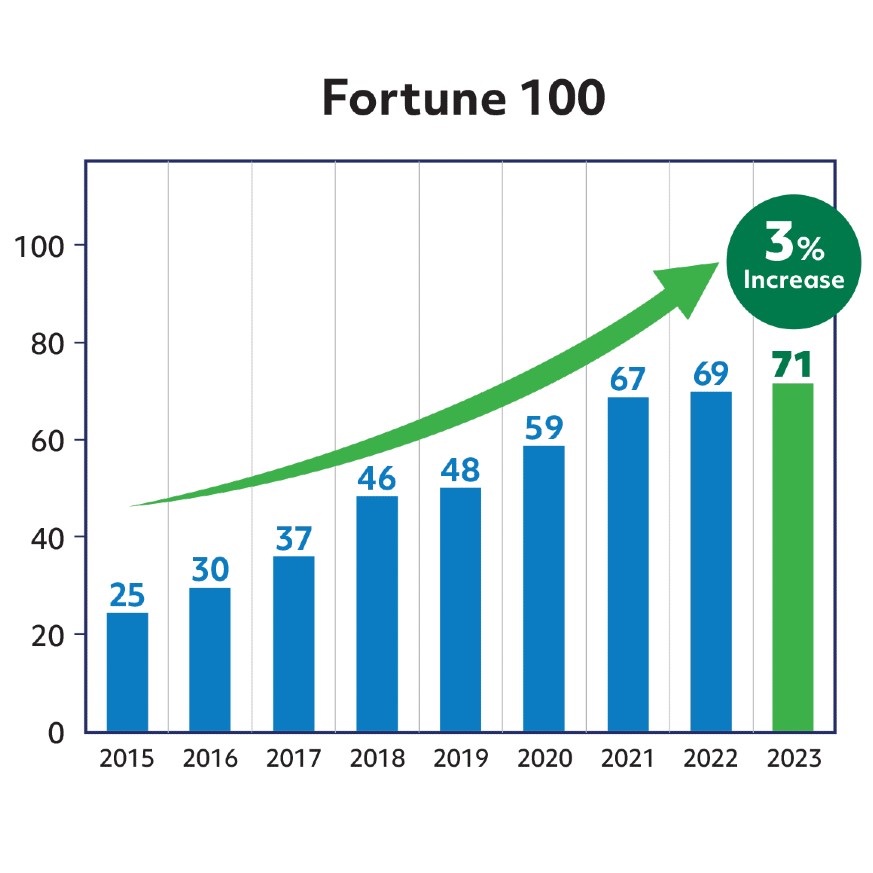
Fortune 500
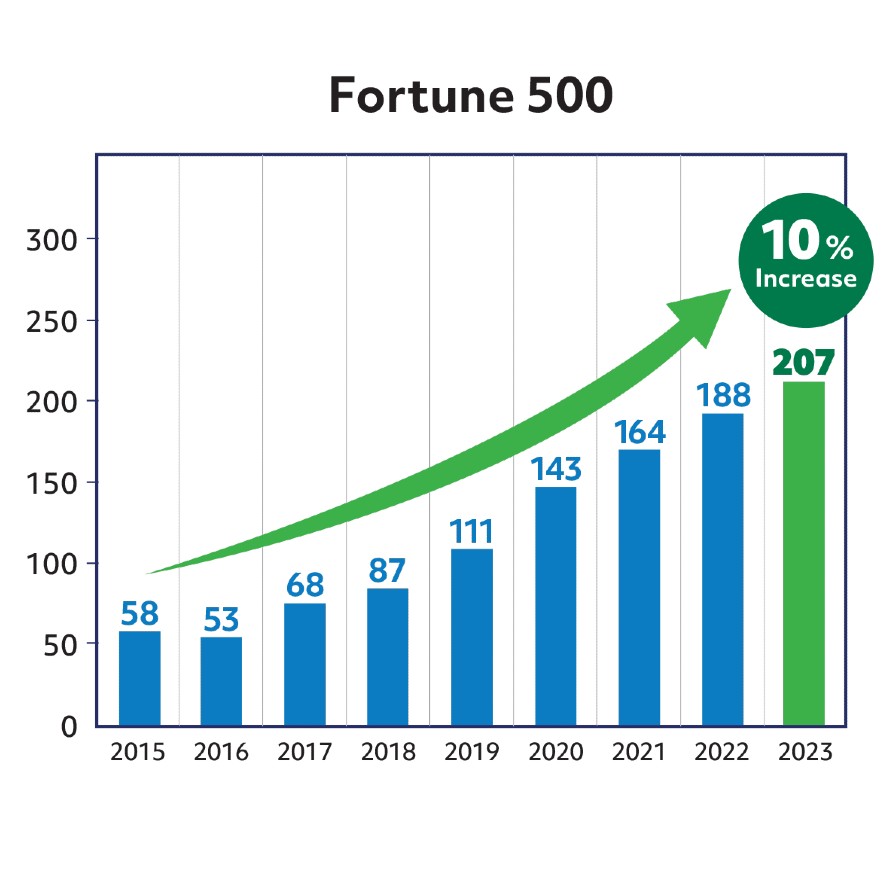
Am Law 200
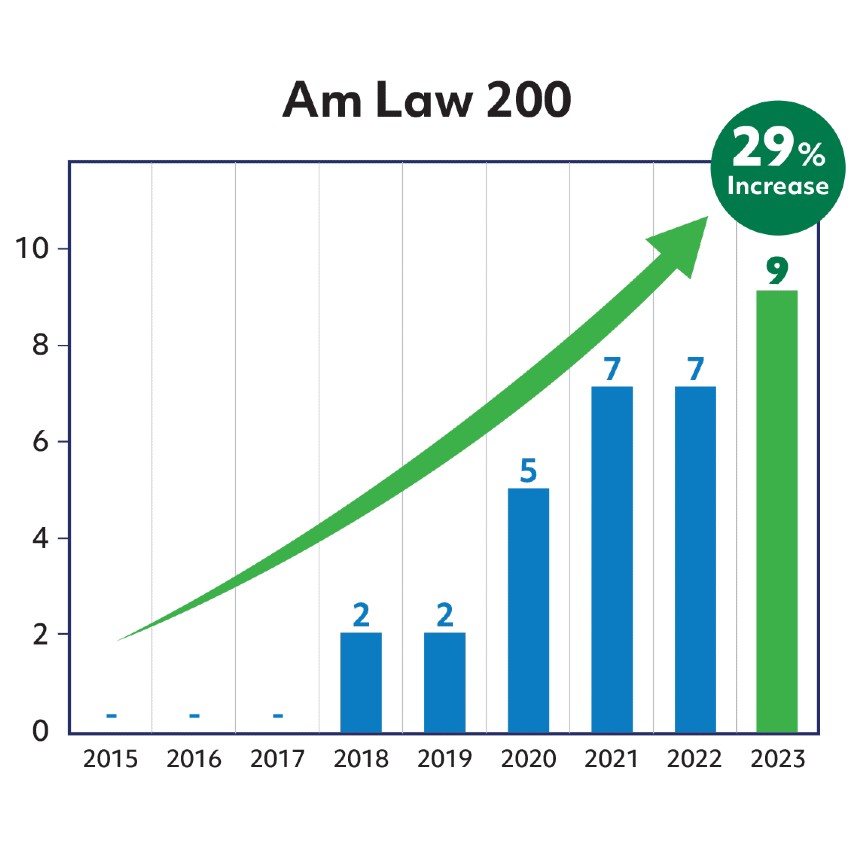
Interpreting the 2023 DEI
Adoption & Advancement of Disability Inclusive Practices
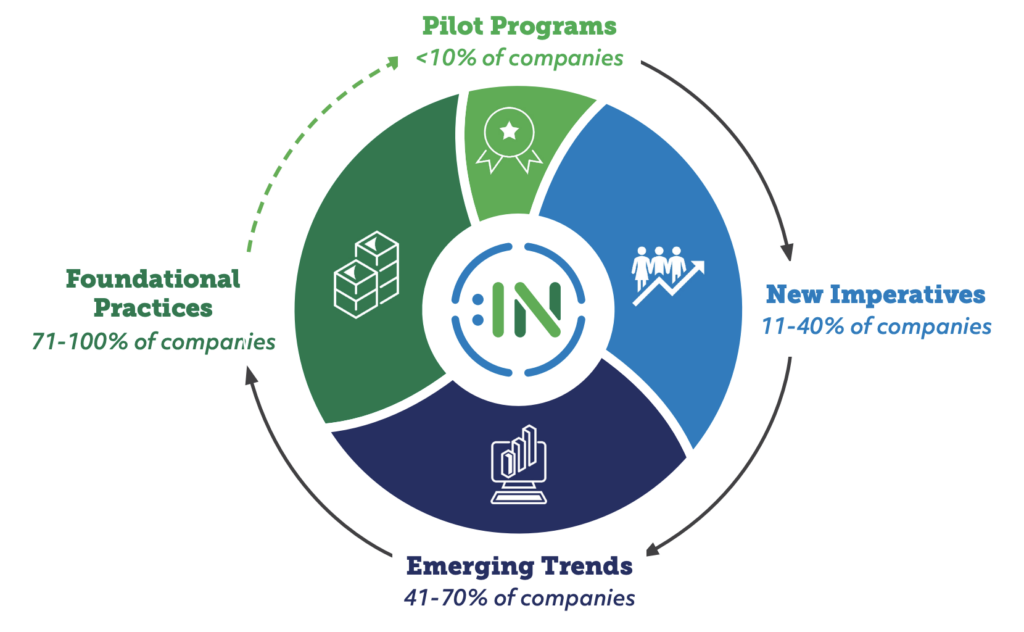
The disability-inclusive practices measured by the DEI have been adopted by companies at varying rates. This framework for assessing the adoption and advancement of each practice breaks down into four categories: Foundational Practices, Emerging Trends, New Imperatives, and Pilot Programs. The graphic above illuminates the arc of maturity that traces disability inclusion initiatives from initial implementation as Pilot Programs through the process of becoming Emerging Trends and New Imperatives, until they are adopted as Foundational Practices, which are widely practiced by most DEI participants.
Foundational Practices

The journey toward sustainable corporate disability inclusion begins with the elemental programs and policies a company needs to effectively welcome and support people with disabilities.
The majority of DEI companies (71%-100%) incorporate the following Foundational Practices. Employment practices that have become nearly universal such as offering flexible work options, having a written accommodations policy, and encouraging confidential self identification are found in this section as are practices such as having a disability-focused E/BRG, providing philanthropic support to an external disability organization or event, and having a dedicated supplier diversity leader.
Foundational Practices Adoped by 71% to 100% of DEI Participants
Culture and Leadership
- 92% have a senior executive (within two levels of the CEO) who is a visible ally for the disability community (90% in 2022)
- 89% have an officially recognized
disability-focused Employee Resource
Group (ERG) or Affinity Group (88% in 2022) - 83% have a written statement of
commitment to Diversity & Inclusion that
specifically mentions disability (79% in
2022)
Community Engagement
- 88% provided philanthropic support to an external disability related event or organization in 2022 (88% in 2022)
- 85% have a formal program(s) in place to understand how to address the needs of the disability community (83% in 2022)
- 72% market directly to the disability
community by depicting people with disabilities in their internal or external marketing and/or advertising materials (70% in 2022)
Employment Practices
- 99% offer flexible work options (96% in 2022)
- 93% have a company-wide disability accommodation policy (93% in 2022)
- 93% encourage employees to
self-identify as a person with a disability (91% in 2022) - 91% include disability-focused information in new hire orientation (91% in 2022)
- 85% provide a wellness benefit(s) that extends beyond their EAP or mental health benefits (84% in 2022)
- 85% have employee retention
and advancement programs that focus on or include employees with disabilities (79% in 2022)
Supplier Diversity
- 84% have in place a Supplier Diversity Manager/Leader(s) who is dedicated to overseeing supplier diversity initiatives for their business (81% in 2022)
Emerging Trends
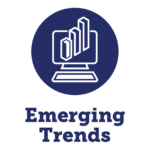
True leadership on disability inclusion requires more than simply doing most of the things most other companies are doing. Leading companies are leaning into the next wave of policies and practices that are gaining momentum inside corporations and setting an example that their peers can look to follow.
A growing share of DEI companies (41%-70%) incorporate the following Emerging Trends. This section features two Employment Practices, offering Interview candidates the option to request an accommodation and using data to track the hiring of people with disabilities, that are moving towards becoming Foundational Practices. A high concentration of accessibility policies and programs can also be found in this section with adoption rates higher than reported on the 2022 DEI, providing indications that corporate accessibility programs are beginning to become more widespread.
Emerging trends adopted by 41% to 70% of DEI participants
Culture and Leadership
- 57% have a company-wide external hiring goal(s) for people with disabilities (60% in 2022)
- 45% review the aggregate engagement survey results for employees who have identified as having a disability (40% in 2022)
Community Engagement
- 60% have a plan in place to ensure social media postings are accessible (55% in 2022)
- 59% supported or shaped disability-inclusion initiatives in calendar year 2022 (59% in 2022)
Enterprise-Wide Access
- 64% have a requirement to ensure digital products are accessible and usable by individuals with disabilities (62% in 2022)
- 62% have an accessibility expert(s) (internal or external) who can resolve accessibility and compatibility issues enabling employees with disabilities to use internal facing digital products (61% in 2022)
- 57% audit their external facing digital products for accessibility (54% in 2022)
- 55% are investing in internal and/or external innovative technology to advance digital accessibility (50% in
2022) - 45% have conducted usability studies to verify that the communications options work effectively with screen reading and other assistive technology (40% in 2022)
Emerging trends adopted by 41% to 70% of DEI participants
Employment Practices
- 69% make all job interview candidates aware of the option to request an accommodation(s) for the interview (61% in 2022)
- 68% use the numerical data to track progress in hiring people with disabilities (66% in 2022)
- 64% offer a Supplemental LongTerm Disability (SLTD) insurance benefit (64% in 2022)
- 58% have a centralized accommodations fund or allow managers to have a “budget margin” with disability accommodations expenses (55% in 2022)
- 53% offer paid caregiver leave to employees (51% in 2022)
- 52% require all people managers to take at least one (1) of the trainings for disability inclusion (51% in 2022)
- 51% have employees with significant disabilities who utilize supported employment programs (45% in 2022)
Supplier Diversity
- 56% have a written supplier diversity statement of commitment from a member of their senior executive team (CEO or two levels removed from CEO) that specifically mentions disability
(53% in 2022) - 50% had expenditures with certified disability-owned businesses (NA in 2022)
Non-U.S. Operations
- 64% have disability inclusive standards of non discrimination in the workplace that apply to all employees outside of the United States (64% in 2022)
- 44% have established chapters of their disability-focused Employee Resource Group (ERG) or Affinity Group outside the U.S. (42% in 2022)
New Imperatives
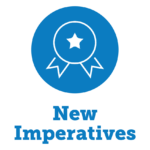
A disability inclusion strategy that is forward-thinking and responsive to the needs of an ever-changing workforce and customer base takes the perpetual development and deployment of cutting-edge programs and policies. These efforts require more than a charismatic, committed leader to succeed and sustain, they need a culture of inclusion that is woven into an organization’s operations and ways of working.
A smaller share of DEI companies (11%-40%) incorporate the following New Imperatives. This section features cultural commitments such as making disability an explicit component of senior executive evaluations and disclosures in external diversity reports as well as auditing internal digital platforms and Smartphone apps for accessibility. Supplier diversity practices such as including disability in council missions, having disability spend goals, and requiring Tier 2 spend with disability-owned suppliers are also examples of New Imperatives.
New imperatives adopted by 11 to 40% of DEI participants
Culture and Leadership
- 29% say disability inclusion is specified as a written component of diversity within senior executives’ performance evaluations (25% in 2022)
- 24% publish diversity report(s) that include data on employees who identify as having a disability (22% in 2022)
Community Engagement
- 34% have a smartphone app and have audited their app for digital accessibility (37% in 2022)
Enterprise-Wide Access
- 40% audit their internally facing digital products for accessibility (36% in 2022)
Culture and Leadership
- 29% say disability inclusion is specified as a written component of diversity within senior executives’ performance evaluations (25% in 2022)
- 24% publish diversity report(s) that include data on employees who identify as having a disability (22% in
2022)
Supplier Diversity
- 26% have a supplier diversity council or committee with a mission that specifically includes disability inclusion as an area of focus (24% in 2022)
- 25% have company-wide disability-focused goal(s) in place for supplier diversity and inclusion (27% in 2022)
- 22% require at least some of their prime suppliers to have expenditures with disability-owned businesses in their Tier 2 supplier diversity program (21% in 2022)
Pilot Programs

Today’s inspired and innovative ideas can often become tomorrow’s standard practice with the right level of visibility, support and long-term commitment.
Less than 10% of DEI companies incorporate the following Pilot Programs. Here you’ll find non-weighted practices focused on making disability a part of the board governance process.
Pilot programs adopted by <10% of DEI participants
Culture and Leadership
- 7% of documents that govern nominations of Directors on the corporate boards specifically mention the consideration of people with disabilities (10% in 2022)
- 7% have someone who openly identifies as having a disability serving on their company’s corporate Board of Directors (6% in 2022)
- 2% of companies publicly disclose or report on this information (2% in 2022)
Employment Practices
- 5% have an employee retention and advancement program(s) solely focused on employees with disabilities (5% in 2022)
Modernizing the Corporate Board
The DEI Takes on Boardroom Representation
In 2022, the DEI added three questions aimed at understanding the representation of people with disabilities at the board level. Companies can seek out, appoint, and report on disabled board directors to achieve their board-level diversity requirements and ESG goals.
Learn More by Checking out Board Are IN
Do the documents that govern nomination of Directors on your corporate board specifically mention the consideration of people with disabilities?
Yes: 35 (7%)
No: 416 (84%)
No, but plan to within the
next year: 34 (7%)
Does someone who openly identifies as having a disability serve on your company’s corporate Board of Directors?
Yes: 36 (7%)
No: 238 (49%)
Do Not Know: 211 (44%)
If YES to the previous question, does the company publicly disclose or report on this information?
Yes: 10 (2%)
No: 25 (5%)
No, but plan to within
the next year: 1 (0.2%)
The DEI Goes Global
The two-year Global Disability Equality Index (Global DEI) pilot was launched in 2021 in response to the demand for an international disability benchmarking tool. The U.S. DEI has been vital in advancing economic opportunities for individuals with disabilities, and insights gained from the DEI have equipped companies with the knowledge to shape more inclusive policies, programs, and initiatives that have the potential for global scalability. Phase I and Phase II of the Global DEI pilot engaged a total of 98 companies that collectively submitted responses for operations in 66 countries. The pilot was not scored, and no top scorers were named. The primary purpose was to test the feasibility of the questions outside the U.S., and to gather knowledge about legal frameworks for disability employment around the world.
Following the two-year pilot cycle that was available for select companies only, the Global DEI will officially launch as a scored benchmark available to a broader range of companies in 2024 with registration to open in Fall 2023. The Global DEI will be integrated into the same platform as the U.S. benchmark, and will first launch in the following countries: Brazil, Canada, Germany, India, Japan, the Philippines, and the United Kingdom. The initial group of seven countries were selected to ensure adequate global representation across geographic regions and reflect the demand for disability inclusion benchmarking in many of the countries most frequently submitted for the Global DEI pilot.
In analyzing feedback from nearly 100 participating companies, a clear rationale for a benchmarking tool that could be adapted for differing cultural contexts emerged. The Global DEI is poised to play a pivotal role in driving positive change, empowering private companies to promote disability inclusion in the countries where they operate regardless of if those countries have existing legal frameworks around disability employment. The Global DEI will allow organizations to track their progress over time, set priorities, and compare their performance to others, facilitating continuous improvement in disability inclusion efforts.
Global DEI Pilot Submissions by Country
- Argentina (7)
- Australia (11)
- Austria (4)
- Bangladesh (3)
- Belgium (10)
- Bolivia (2)
- Brazil (20)
- Canada (16)
- Chile (5)
- China (28)
- Colombia (7)
- Costa Rica (4)
- Czech Republic (4)
- Denmark (3)
- Dominican Republic (2)
- Egypt (2)
- El Salvador (3)
- Estonia (1)
- Ethiopia (1)
- Finland (4)
- France (17)
- Germany (17)
- Hungary (2)
- India (28)
- Ireland (9)
- Israel (3)
- Italy (9)
- Japan (5)
- Kenya (1)
- Latvia (1)
- Lithuania (1)
- Luxembourg (1)
- Malaysia (6)
- Mexico (13)
- Morocco (2)
- Mozambique (1)
- Netherlands (10)
- New Zealand (5)
- Nigeria (2)
- Norway (5)
- Pakistan (4)
- Panama (3)
- Paraguay (2)
- Peru (3)
- Philippines (13)
- Poland (7)
- Portugal (6)
- Romania (2)
- Saudi Arabia (4)
- Singapore (5)
- Slovakia (2)
- South Africa (5)
- South Korea (5)
- Spain (7)
- Sri Lanka (2)
- Sweden (5)
- Switzerland (10)
- Taiwan (2)
- Tanzania (1)
- Thailand (4)
- Uganda (2)
- Ukraine (3)
- United Arab Emirates (7)
- United Kingdom (39)
- Uruguay (2)
- Zambia (2)
The high-level insights that follow encapsulate the progress and challenges faced by companies seeking to advance disability inclusion in the countries where they operate. These findings provide valuable insights into the efforts being made to remove barriers and promote accessibility for employees with disabilities and are based on categorical interpretation rather than rates of adoption.
Culture and Leadership
While companies made strides during the Global DEI pilot, data consistently showed that satellite locations would benefit greatly from committed advocates and allies championing the advancement of inclusive employment. Wherever Employee Resource Groups (ERGs) were active and senior leaders prioritized inclusion, satellite locations benefited from well-communicated disability policies, accommodations, and employee benefits. These locations were much more likely to have disability-focused recruitment practices and long-term sustained engagement with local disability groups that could offer both accountability and insight.
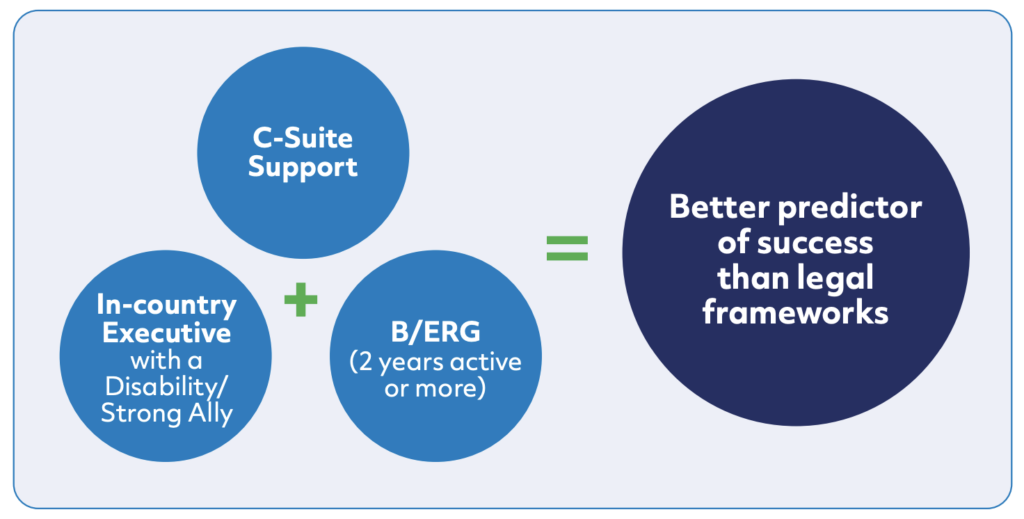
Enterprise-Wide Access
The presence of the following accessibility policies and practices in satellite locations were highly correlated with active disability-focused Employee Resource Groups (ERGs) and leadership allies across both Global DEI pilot phases.
This correlation appears to be true even for satellite locations within the same company, regardless of the region. There were a few notable exceptions, with some companies taking an enterprise-wide approach to implementing accessibility. Aside from these exceptions, the data consistently showed satellite locations with active disability-focused ERGs and engaged local executive sponsors had more affirmative responses for Enterprise-Wide Access.
- Accessible physical locations and emergency plans that incorporate multiple ways to provide assistance to people with disabilities
- Digital procurement guidelines with
built-in accessibility requirements - Commitment to accessible internal
and external communications
The availability of low-cost accessible technology continues to be a benefit for companies that have increased their commitment to accessibility following the pandemic and emergence of hybrid workspaces. A commitment to implementing an accessibility plan for digital products and requirements was cited by 42% of Global DEI companies in 2022 compared with just 28% in 2021. Similar commitments to accessible external communications were also present among Global DEI companies with 43% affirming such practices in 2022 compared with 27% in 2021. Some of the biggest improvements were found in China, India, the Philippines, Brazil, and Mexico which all boast large populations under 35, and possess known agility in adapting to new technologies.
A commitment to implementing an accessibility plan for digital products and requirements was cited by 42% of Global DEI companies in 2022 compared with just 28% in 2021.
Similar commitments to accessible external communications were also present among Global DEI companies with 43% affirming such practices in 2022 compared with 27% in 2021.
Some of the biggest improvements were found in China, India, the Philippines, Brazil, and Mexico which all boast large populations under 35, and possess known agility in adapting to new technologies.
Adjustments and Accommodations
Each country uses its own legal definition of disability, and some definitions cover a much wider range of disabilities than others. It is therefore rare to find a written disability accommodations policy that is standardized for all satellite locations. The majority ( 62%) of Global DEI companies reported having written disability accommodations policies, although they differed from country to country. Additionally, 55% of Global DEI companies have a written disability accommodations procedure, however just 33% indicated having a dedicated in-house or outsourced accommodations specialist.
Employment Practices
The percentage of Global DEI companies offering mental health or employee assistance programs (EAPs) jumped from 75% in 2021 to 92% in 2022. Covid-19 normalized discussions of non-apparent disabilities in many countries, especially those related to mental health. Conversely, a vast discrepancy was found in the percentage of Global DEI companies that provide at least partial vision coverage (76%) when compared to those that offer hearing aid and hearing care (38%). This can somewhat be attributed to hearing care being covered through government healthcare in many countries, however the wide disparity presents a potential missed opportunity. Opportunities also persist related to advancement and retention as only 21% of Global DEI companies have such programs that are inclusive of people with disabilities. Fewer still (14%) reported having advancement and retention programs specifically designed for employees with disabilities.
Community Engagement
This category showed the greatest variation between satellite locations, perhaps because satellites have more flexibility in deciding which local initiatives to publicly support. Disabled leaders and allies drove the agenda for companies that were highly active even in the pandemic, and who built strong relationships with disability-focused non-governmental organizations (NGOs) and philanthropic groups. This better positioned them to address the needs of the disability community, both within their company and externally. Satellite locations with an Employee Resource Group (ERG) were much more likely to have held a focus group, conducted market research, and worked with a disability consultant or expert on identifying areas of opportunity.
In Brazil, India, and the Philippines, community engagement was heavily influenced by grassroots involvement, local partnerships, and a growing awareness that the empowerment of individuals with disabilities is conducive to sustainable economic development. In all three areas, the challenges were evident in the absence of supportive infrastructure such as limited access to accessible transportation and poor enforcement of laws requiring buildings to be accessible to those with limited mobility. Company locations that sustained a rigorous level of engagement with disability groups focused on these issues were spurred to do so by their in-country or regional ERGs.
Supplier Diversity
Most Global DEI companies currently have supplier diversity/responsible procurement programs inclusive of disability-owned businesses in the United States. Disability-owned businesses in the U.S., Canada, and the United Kingdom are reliably certified by trusted entities, however that same robust ecosystem is still in its nascent stages in many of the countries surveyed by the Global DEI. Supplier diversity questions will remain a part of the Global DEI for information-gathering purposes with the intent that data will inform future efforts to scale certification programs for disability-owned businesses in additional markets.
Conclusion
Organizations have undoubtedly faced challenges in prioritizing diversity, equity, and inclusion amidst financial constraints, and for many multinational companies the current economic climate continues to impact the rollout of more ambitious disability inclusion plans. However, it is necessary to recognize that promoting disability inclusion during an economic slowdown brings significant advantages in the long-term, most crucially in building a resilient workforce with low turnover rates. When asked about their rationale for maintaining a strong commitment to disability inclusion through economic downturns, companies that performed well on the Global DEI reported that investing in inclusivity strengthened their reputation and stakeholder relationships while fostering innovation and trust among their employees. In countries with minimal enforcement around disability rights, that consistent commitment to inclusion from multinational companies challenges popular misconceptions around the employment of people with disabilities. This can lead to a broader cultural shift where people with disabilities are viewed as valuable contributors to society, capable of achieving great things when provided equal opportunities.
The 2023 DEI: Why We Participated
The Disability Equality Index (DEI) has become an integral and trusted component of many companies’ diversity benchmarking strategies. Results are leveraged as a roadmap for advancing disability-inclusive policies and practices for employees, customers, suppliers, and community stakeholders. Here’s why a few participating companies find the DEI so valuable:
Brown-Forman Corporation

Brown-Forman is participating in the DEI to provide a benchmark for areas we are doing well in and, more importantly, areas we can improve upon both now and into the future. The DEI is an excellent resource which provides an honest evaluation as well as meaningful recommendations to help us ensure we are being inclusive and providing working environments and consumer experiences that allow everyone to comfortably participate.
Cintas
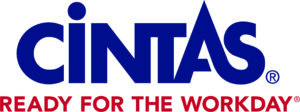
Cintas’ company culture places a heavy value on diversity, equity, and inclusion (DEI) throughout our business. We’re intentional about benchmarking our efforts and initiatives accordingly and echoing the business and personal impacts of our DEI strategy to our employee-partners.
Humana

Humana seeks to be a leading diversity, equity, and inclusion employer and is committed to disability inclusion in the hiring and retaining of our talent. We recognize the Disability Equality Index (DEI) is a comprehensive benchmarking tool that will help us continue our journey to achieve disability inclusion and equality. Humana’s participation in the DEI supports our efforts to create measurable and intentional actions for fostering a vibrant, diverse culture and environment of inclusion.
International Business Machines Corporation
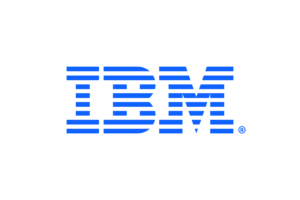
We want to see how our diversity and inclusion (D&I) efforts measure up using this well established and recognized process. We plan to use the results to help us create an action plan to improve our D&I program.
Lyft, Inc.
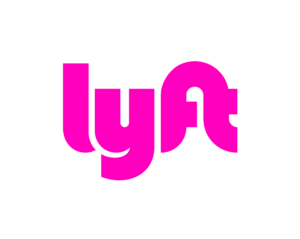
We’re focused on creating an accessible platform that everyone can use and a workplace where everyone can thrive. The DEI helps us evaluate our progress toward inclusion, and reminds us to lead with our core values: take care of each other, build great teams, and deliver impact.
State Farm

State Farm continually strives to be an inclusive workplace for all demographic groups. The DEI survey is one way we can ensure we continue to provide an environment where people with disabilities feel welcome and can be their authentic selves.
T-Mobile USA, Inc.
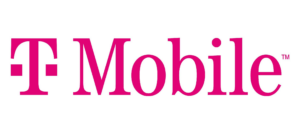
T-Mobile is committed to diversity, equity, and inclusion and empowering every member of our team – including those with disabilities – to bring our ‘Be You’ culture to life every day. Participating in the Disability Equality Index helps enhance our inclusive company culture, enabling us to better serve our customers.
Unilever United States, Inc.
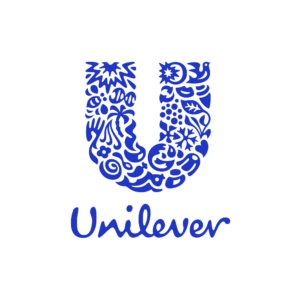
At Unilever, we believe in putting people first, and fostering equity is central to our commitment to contributing to a fairer, more socially inclusive world. Our global goal is for 5% of our workforce to include people with disabilities by 2025. It’s one of the ways we are pursuing a culture where everyone can belong, thrive, and be treated with respect.
United Natural Foods, Inc.

United Natural Foods, Inc. is committed to implementing best inclusion practices for all associates. We are passionate about identifying areas of growth and solidifying our strengths. The Disability Equality Index will allow us to be an employer of choice for people with disabilities by providing us with tangible steps to improve our disability and inclusion practices.
Voya Financial
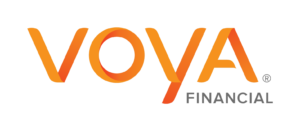
Voya Financial understands that, without measurement, it is difficult to identify gaps in the workplace for people with disabilities and caregivers. Our commitment to measurement and benchmarking are key reasons that Voya participates in the Disability Equality Index. Measuring progress helps us enhance our employee experience and better serve our clients and communities.
Walmart Inc.

Walmart uses data and insights from the Disability Equality Index (DEI) to help inform our belonging strategy, and through the DEI’s informal community of practice, we have connected with other belongingoriented companies to share best practices.
Withum

Withum annually participates in the DEI to continue expanding our best practices, leaning into new resources for accessibility, culture, and career advancement for people with disabilities.

